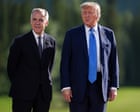
In recent global events, stories of trade developments, extreme weather manifestations, and humanitarian efforts have been making headlines. These subjects reflect the interconnectedness of international economies, environmental challenges, and the pursuit of global humanitarian relief. As we delve into these topics, a calm understanding of current situations can guide our reflection and response.
In the realm of international trade, a significant development has emerged between the United States and Canada. Former President Donald Trump signed an executive order to increase tariffs on Canadian goods imported into the United States from 25% to 35%. This decision was framed within the context of ongoing trade tensions between the two nations. The new tariff rates, effective from Friday, apply to products not covered by the US-Mexico-Canada trade agreement. Additionally, goods that are transshipped through another country to evade these new tariffs are subject to a 40% transshipment levy. The move has been viewed as a strategic alignment amidst a broader focus on illicit trade across the northern border.
Turning to environmental developments, northern China has recently experienced severe weather conditions with deadly consequences. Torrential rains have caused widespread flooding in Beijing and surrounding areas, leading to the unfortunate loss of at least 70 lives. This recent inundation is part of a troubling pattern of extreme rainfall in recent months. Specific areas such as Miyun registered record rainfall levels, highlighting the profound impact of climate variability. The environmental challenges are further underscored by the Chinese authorities’ rare admission of shortcomings in their disaster preparedness. Yu Weiguo, a local official from the affected Miyun district, acknowledged gaps in readiness during a press briefing, signifying a candid reflection on the need for improved resilience in the face of such extreme weather events.
Meanwhile, in a deeply humanitarian context, efforts to provide relief in conflict-stricken areas continue to face complex challenges. The Freedom Flotilla Coalition, a coalition aimed at ending the blockade of Gaza, recently reported an altercation involving American labor activist Chris Smalls. The Israeli Defense Forces (IDF) intercepted and boarded an aid ship named Handala. This ship carried essential supplies including food, baby formula, diapers, and medicine, destined for the people of Gaza. Reports from the coalition claimed that Smalls, a prominent figure in labor activism known for his work co-founding the Amazon Labor Union, was physically assaulted during the interception. This situation underscores the pressing humanitarian needs in Gaza, where hunger and deprivation present ongoing struggles.
Each of these stories exemplifies the diverse yet interconnected challenges facing the world today. They urge a collective awareness and a compassionate engagement with the varied realities that define our shared global landscape. As we consider these developments, let us do so with a calm resolve to advocate for solutions that support harmonious relations, environmental stewardship, and humanitarian aid. By nurturing understanding and cooperation, the global community can strive to meet these challenges constructively for the benefit of all.
Source: {link}
